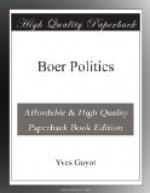4.—British Sphere of Influence in 1838.
In a few lines Dr. Kuyper draws a conventional picture of British policy with regard to the Boers, making it out to be ever greedy of power. The contrary is the truth. A vacillating and timid policy has been England’s great mistake in South Africa; it is this very vacillation that has brought about the present war.
Dr. Kuyper bitterly reproaches the English for having in 1842, six years after the Great Trek, claimed those emigrants as British subjects. The Great Trek was similar to the emigration of the Mormons. The United States have never admitted that they were at liberty to found a separate State within the limits of the national possessions. If on the same ground alone English had proclaimed their suzeranity over the Boers who were endeavouring to form States in Natal, the Orange Free State, and the Transvaal, they would have been perfectly within their rights; but Dr. Kuyper forgets that as far back as 1836 England promulgated the Cape of Hope Punishment Act. The object of that Act was to repress crimes committed by whites under English dominion throughout the whole of South Africa, as far north as the 25 deg. South Latitude; that is, as far as the Portuguese frontier; and it is so thoroughly imbued with that idea, that it specially excepts any Portuguese territory south of that latitude. It is thus proved that with the exception of the portions occupied by the Portuguese, England claimed, as comprised within her sphere of influence, the whole of the remaining South African territory. A certain number of Boers, irreconcilably opposed to British rule, so fully recognised this, that they trekked as far as Delagoa Bay. Another object of the Act was the protection of the Natives against the Boers. The constantly recurring and sanguinary conflicts between the Boers and the Zulus led England to extend her direct sovereign rights to Natal for the peace, protection and good government of all classes of men, who may have settled in the interior or vicinity of this important part of South Africa.
5.—England, the Transvaal, and the Orange Free State.
Far from being anxious to assume direct control over these territories, the Cape Government for a long time disregarded the petitions for annexation addressed to it by the inhabitants of Durban; until one fine day, a Dutch vessel laden with provisions for the Boers, arriving in Port Natal, the Captain, Smellekamp, took it upon himself to assure them of the protection of the King of Holland. Thereupon, England established a small garrison under the command of Captain Smith. It was attacked by the Boers; a volunteer, named Dick King, contrived to make his escape from the town, and after an adventurous journey reached Grahamstown. Troops were despatched by the Government, and it was incorporated with the Cape Colony; some of the Boers left Natal, some remained; their descendants are there to-day.




